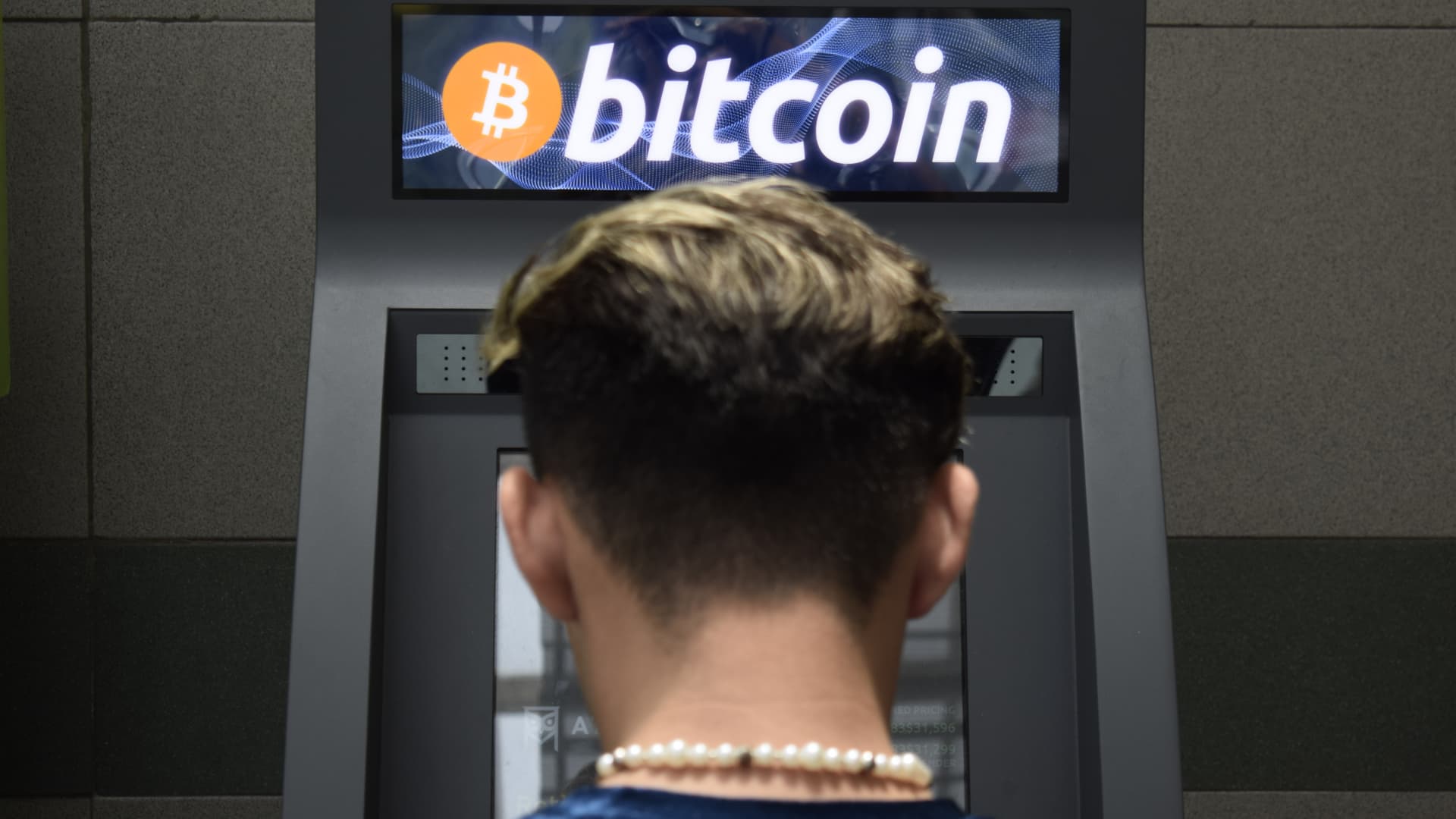
A bystander uses a Bitcoin ATM in San Salvador, El Salvador, on May 16, 2022.
Alex Pena | Anadolu Agency | Getty Images
El Salvador bet its economic salvation on bitcoin, but so far the gamble isn’t paying off like President Nayib Bukele hoped it would.
The government’s crypto coffers have been cut in half, bitcoin adoption nationwide isn’t really taking off, and crucially, the country needs a lot of cash, fast, to meet its debt payments of more than $1 billion in the next year. This comes as the price of bitcoin has fallen more than 70% from its November 2021 peak, and more than 55% from the time Bukele announced his plan.
Meanwhile, El Salvador’s economic growth has plummeted, its deficit remains high, and the country’s debt-to-GDP ratio — a key metric used to compare what a country owes to what it generates — is set to hit nearly 87% this year, stoking fears that El Salvador isn’t equipped to settle its loan obligations.
Pair these economic woes with a renewed war on gang violence, and you have all the fixings of a country on the brink.
“On the surface, the whole bitcoin thing hasn’t really paid off,” said Boaz Sobrado, a London-based fintech data analyst.
It isn’t bitcoin’s fault that the government is edging toward financial ruin.
The government has an unrealized paper loss on bitcoin of around $50 million, which the finance minister notes is less than 0.5% of the national budget. In aggregate, the entire experiment (and all its associated costs) have only run the government around $374 million, according to estimates. That’s not nothing — especially considering the fact that El Salvador has $7.7 billion of bonds outstanding — but to an economy of $29 billion, it is comparatively small.
The optics aren’t good, though.
Negotiations have stalled with international lenders in part because they are unwilling to throw money at a country that is spending millions in tax dollars on a cryptocurrency whose price is prone to extreme volatility. Rating agencies, including Fitch, have knocked down El Salvador’s credit score citing the uncertainty of the country’s financial future, given the adoption of bitcoin as legal tender. That means that it’s now even more expensive for President Bukele to borrow much-needed cash.
“In terms of their financial situation, El Salvador is in a very difficult place. They have a lot of bonds that are trading severely discounted,” continued Sobrado.
“The economic policy of the country is essentially magical thinking,” said Frank Muci, a policy fellow at the London School of Economics, who has experience advising governments in Latin America.
“They’ve spooked the bejesus out of financial markets and the IMF,” continued Muci, who tells CNBC that nobody wants to lend money to Bukele unless it’s at “eye-gouging rates” of 20% to 25%.
“The country is sleepwalking into a debt default,” said Muci.
But the millennial, tech-savvy president, who once touted himself as the “world’s coolest dictator” on his Twitter bio, has tethered his political fate to this crypto gamble, so there is a very big incentive to make it work in the long run — and to pay off the country’s debt in the interim. Bukele faces re-election for another five-year presidential term in 2024.
Snapshot of the Salvadoran economy
Well before President Bukele got it in his head that bitcoin was a magical elixir that would bandage over longstanding economic vulnerabilities, the country was in a lot of trouble.
Its debt-to-GDP ratio is almost 90%, and its debt is expensive at around 5% per year versus 1.5% in the U.S. The country also has a massive deficit — with no plans to reduce it, whether through tax hikes or by substantially cutting spending.
In a research note from JPMorgan, analysts warn that El Salvador’s Eurobonds have entered “distressed territory” in the last year, and S&P Global data reportedly shows that the cost to insure against a sovereign debt default is hitting multi-year highs.
Both JPMorgan and the International Monetary Fund warn the country is on an unsustainable path, with gross financing needs set to surpass 15% of GDP from 2022 forward — and public debt on track to hit 96% of GDP by 2026 under current policies.
“In the past three, four months, what they’ve done is implement gasoline subsidies, which are super expensive,” said Muci, who has expertise in economic diversification and public financial management, and has taken part in applied research projects for El Salvador, Venezuela, and Honduras.
“This is a country that’s rudderless in terms of economic policy. I mean, they don’t know where they’re going, or what they’re doing. I think it’s a classic case of one day at a time,” he said.
All this comes as El Salvador faces imminent debt repayment deadlines in the billions of dollars, including an $800 million Eurobond that matures in January.
El Salvador has been trying since early 2021 to secure a $1.3 billion dollar loan from the IMF — an effort that appears to have soured over President Bukele’s refusal to heed the organization’s advice to ditch bitcoin as legal tender. This tracks with Fitch’s recent downgrade, which was also attributed to El Salvador’s “uncertain access to multilateral funding and external market financing given high borrowing costs,” plus its “limited scope for additional local market financing.”
The president’s efforts to consolidate power have also driven up this risk premium. Bukele’s New Ideas party has control over the country’s Legislative Assembly. In 2021, the new assembly came under fire after it ousted the attorney general and top judges. The move prompted the U.S. Agency for International Development to pull aid from El Salvador’s national police and a public information institute, instead re-routing funds to civil society groups.
Additionally, El Salvador can’t print cash to shore up its finances. El Salvador dollarized in 2001, meaning that it ditched its local currency, the colón, in favor of the U.S. dollar. Only the Federal Reserve can print more dollars. Meanwhile, its other national currency, bitcoin, is revered for the fact that it, too, is impossible to mint out of thin air.
The bitcoin experiment
In Sept. 2021, El Salvador became the first country to adopt bitcoin as legal tender.
The initiative involved buying bitcoin with public funds, as well as launching a national virtual wallet called “chivo” (Salvadoran slang for “cool”) that offers no-fee transactions and allows for quick cross-border payments. For a country that is a largely cash economy — where roughly 70% of people do not have bank accounts, credit cards, or other traditional financial services — chivo was meant to offer a convenient onramp for those who had never been a part of the banking system.
The experiment also involved building a nationwide infrastructure of bitcoin ATMs across the country and requiring all businesses to accept the cryptocurrency.
The president upped the ante in November when he announced plans to build a “Bitcoin City” next-door to the Conchagua volcano in south eastern El Salvador. The bitcoin-funded city would offer significant tax relief, and geothermal energy rolling off the adjacent volcano would power bitcoin miners.
All in, the government has spent about $375 million on the bitcoin rollout, including a $150 million trust designed to convert bitcoin instantly into dollars, $120 million on the $30 bitcoin bonus given to each citizen who downloaded the chivo wallet (no small sum in a country where the monthly minimum wage is $365), and the roughly $104 million the government has publicly admitted to spending on bitcoin. Muci notes that these expenses plus the $50 million in unrealized losses on the country’s bitcoin portfolio means that the country has spent around $425 million on “making bitcoin happen.”
But nine months in to this nationwide bet on bitcoin, and it doesn’t appear to immediately be delivering on a lot of its big promises.
President Bukele tweeted in January that the app had 4 million users (out of a total population of 6.5 million), but a report published in April by the U.S. National Bureau of Economic Research showed that only 20% of those who downloaded the wallet continued to use it after spending the $30 bonus. The research was based upon a “nationally representative survey” involving 1,800 households.
”In terms of actual penetration of bitcoin transactions, it seems to be quite low,” explained Sobrado. “There seem to have been issues with regards to the state-issued wallets. Lots of people downloaded it, but it was buggy. It wasn’t really the best user experience.”
Of those who did use the government’s crypto wallet, some had technical problems with the app. Other Salvadorans reported cases of identity theft, in which hackers used their national ID number to open a chivo e-wallet, in order to claim the free $30 worth of bitcoin offered by the government as an incentive to join.
Another hope for the chivo wallet was that it would help save hundreds of millions of dollars in remittance fees. Remittances, or the money sent home by migrants, account for more than 20% of El Salvador’s gross domestic product, and some households receive over 60% of their income from this source alone. Incumbent services can charge 10% or more in fees for those international transfers, which can sometimes take days to arrive and require a physical pick-up.
But in 2022, recent data shows that only 1.6% of remittances were sent via digital wallets.
In terms of merchant adoption, a survey published in March by the Chamber of Commerce and Industry of El Salvador found that 86% of businesses have never made a sale in bitcoin.
“They gave people the wallets, they forced businesses to accept them, but essentially, in my opinion, it’s a big nothing burger,” said Muci, who previously worked at the Growth Lab at the Harvard Kennedy School of Government. “Nobody really uses the app to pay in bitcoin. People that do use it, mostly use it for dollars.”
Bitcoin City is on hold, as is the $1 billion bitcoin bond sale, which was initially put on ice in March because of unfavorable market conditions.
If the president’s tweets are to be believed, then the government’s personal bitcoin investment is down about $50 million on paper. (None of these losses are locked in until the country exits its bitcoin position.)
“Ultimately, El Salvador’s problems are just tangential to currency,” said Muci.
“The issues have to do with security, economic productivity and other things. And bitcoin has nothing to do with any of that,” he said.
Debt default unlikely
El Salvador’s big bitcoin gamble may be struggling at the moment, but Sobrado tells CNBC that it has undoubtedly been a win in terms of attracting bitcoin tourists.
“While they might be down in terms of unrealized losses in their bitcoin investment, they are extremely up in terms of tourism,” said Sobrado.
“They have attracted a lot of people who are bitcoin believers and a lot of capital from these people. And I think it is entirely possible that if you think of the unrealized losses as a marketing campaign, El Salvador has already achieved what it wanted to,” continued Sobrado, who also noted that countries like Costa Rica spend billions of dollars on marketing campaigns.
The bitcoin experiment also hasn’t hurt the president’s popularity. Bukele’s approval ratings are north of 85% — thanks in large part to his tough-on-crime approach to leading. That’s no small thing to a country that was more dangerous per capita than Afghanistan five years ago.
“Mr. Bukele is, to this day, one of the most popular presidents that is in power,” said Sobrado. “He has approval rates of 80 plus percent, that people in other parts of the world just dream of.”
As for the country’s oppressive levels of debt, virtually everyone agrees that President Bukele will do whatever it takes to pull together enough cash to make good on what the country owes this year and next. A big part of that incentive comes from the upcoming presidential election in 2024, in which Bukele is vying for another five-year term.
JPMorgan sees a “high likelihood” of that $800 million bond maturity being paid in January, in order to “avoid disruptive credit events that might derail his prospects for a potential re-election.” Although Fitch expects El Salvador to meet its near-term debt service payments, the credit agency warns that keeping pace with its loans will prove “more onerous as the year progresses.”
Muci agrees that El Salvador will be able to scrape together the cash, but he warns that ultimately the country’s public finance situation is unsustainable.
“The plane is gonna crash eventually, if they don’t change things,” said Muci. “If they don’t raise taxes, cut spending, start being much more disciplined. You know, convincing markets that they’re sustainable.”
He added, “Bitcoin doesn’t solve any of El Salvador’s important economic problems.”

